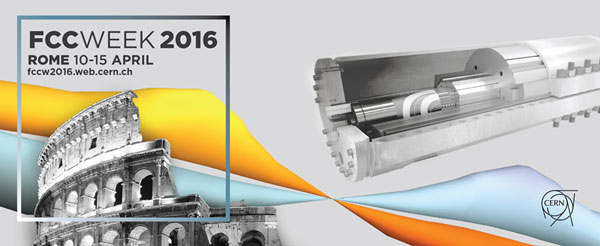ALBA Synchrotron

From Monday April 11 to April 15, more than 450 scientists (including representatives from ALBA), leaders of high-tech industry, universities and research centres gather in Rome (Italy), to review the progress on Future Circular Collider (FCC) concepts for the post-LHC era.
The FCC study has been kicked off in 2014 as a response to a request of the European Strategy for Particle Physics. The study embraces today 74 institutes from 26 nations and is hosted by CERN. Apart from ALBA, the Spanish representation includes CIEMAT and the Instituto de Física Corpuscular
(IFIC,CSIC-UV)
. The European Union supports this activity through the EuroCirCol Horizon 2020 infrastructure development project.
The ALBA Synchrotron role in this project is to contribute in several of the tasks set up in the proposal, specifically, in the management tasks with its broad experience in managing accelerator developments and organising international events and in the vacuum design using its expertise in vacuum system under high thermal load caused by synchrotron radiation. In this last task, a PhD student is performing a thesis project at ALBA in close collaboration with CERN experts.
Francis Perez, head of the Accelerators' division of ALBA, gave a talk outlining the status of the vacuum studies and the enormous technological challenges that remain ahead. The team leading this project proposed a new concept of beam screen for the FCC-hh that fulfils the stringent vacuum requirements, easily removes the much higher than LHC synchrotron light power, and integrates e-cloud suppression. The preliminary design has been tested with mechanical, thermal, and gas density simulations, and the first prototype is ready. A two meter long version will be manufactured by end 2016.
The worldwide FCC collaboration will deliver a Conceptual Design Report by 2019, in time for the next strategy update as a decision aid for a future particle research infrastructure that can serve the worldwide science community throughout the 21st century.
The FCC Week features a public event at the Auditorium in Rome with CERN director general Fabiola Gianotti, INFN president Fernando Ferroni, physicists Michelangelo Mangano and Guido Tonelli, former CERN director of research Sergio Bertolucci, economist Massimo Florio and INFN vice president Antonio Zoccoli. This meeting is held under the high patronage of the president of the Italian republic, underlining the importance of Italy's long-standing academic and technology contributions to leading-edge science endeavours.
Further information: http://fccw2016.web.cern.ch/fccw2016/webkit/index.html
Webcast available: http://fccw2016.web.cern.ch/fccw2016/webcast.html
Social media: http://fccw2016.web.cern.ch/fccw2016/follow-us.html
